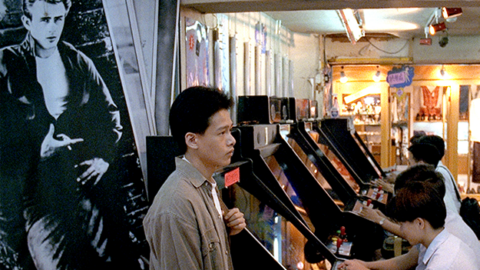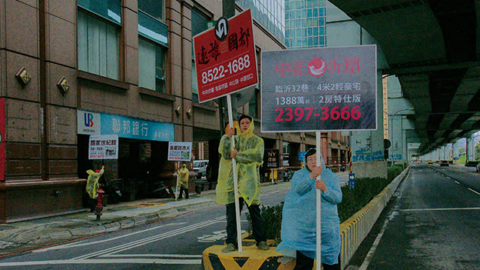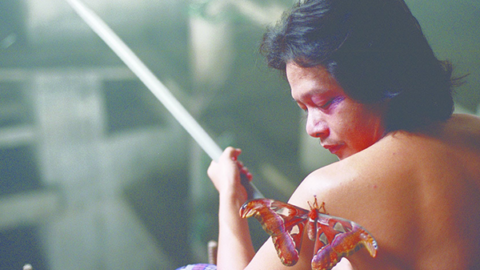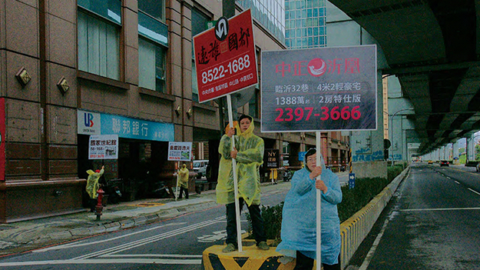Film of the Week: Afternoon
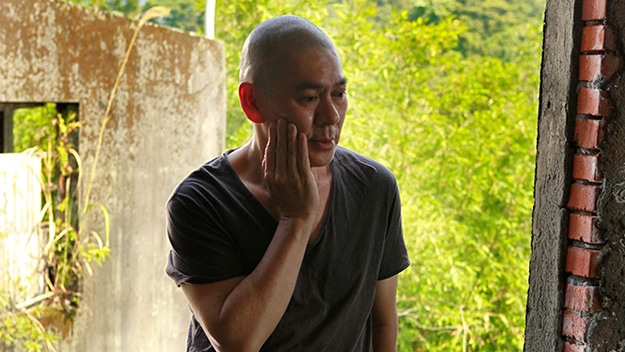
Tsai Ming-liang’s recent work has taken him ever further in a minimalist direction. His last feature, Stray Dogs (13), was still visibly anchored to urban realism, depicting the life of a homeless family, but veered away from conventional narrative in a way that no doubt tested even admirers of his languid mid-period works such as What Time Is It There? (01) and Goodbye, Dragon Inn (03). In it, causality and defined character identity seemed to melt away in the endless Taipei rain as we watched; the film ended with what you might call pure gaze, with two people staring silently at a mural on the wall of an abandoned house. It was hard to imagine just how much further Tsai could go, or whether there was any possible next move for him, at least in any recognizable narrative direction.
Sure enough, Tsai’s 2014 film Journey to the West was his most genuinely minimalist. Effectively a filmed performance piece, it followed Tsai’s regular star Lee Kang-sheng as a Buddhist monk walking across Marseille: walking very . . . very . . . slowly . . . that is, in a Zen exercise, which is what the film itself seemed almost to be. Despite all that Tsai stripped away from his cinema in Journey, which was one in a series of short films following Lee’s performance in the spirit of 7th-century monk Xuanzang*, there was nevertheless plenty to look at: a few interesting corners of Marseille, some street life seemingly captured at random, and a comic subplot of sorts, involving Lee being followed equally slowly by Denis Lavant.
If it’s at all possible, Tsai has now made an even more minimal work, Afternoon, in which two men sit in a room talking for 137 minutes, in four locked shots from exactly the same camera position. Of the two, Tsai and Lee Kang-sheng themselves, only one does much talking. Lee, lazily reclining in his chair, occasionally smoking a cigarette or drinking from a cup, barely moves, says practically nothing for the first 30 minutes, and thereafter offers only the occasional comment, and once a gentle, weary “Uhhh…” sound. “Most days we say very little to each other,” observes Tsai early on. “Even now I feel like I’m talking to myself.”
Talking to himself is effectively just what Tsai is doing in Afternoon: thinking aloud, trying to make sense of his life and career. But he’s talking to us as much as to Lee, and it would be a shame not to take up his invitation to listen. In all likelihood, not that many viewers will, given that Tsai’s cinema is a minority taste at the best of times, and Afternoon supposes—though doesn’t really require—some familiarity with, or interest in, Tsai’s career. It’s a charming film, not least because its subjects are charming, but it’s also moving and not a little painful. It’s one of the more demanding two-men-sitting-talking films (don’t expect My Dinner with Andre or The Trip), but as a statement about an artist and his muse, it’s extraordinarily revealing, wound-baring even.
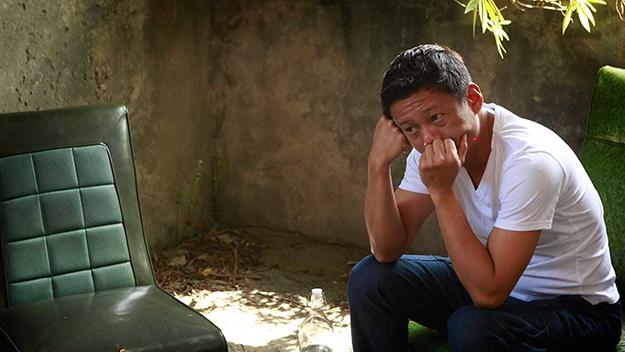
I use the word “muse” knowingly in its traditional sense—Tsai makes it very clear that Lee is the wellspring for all his inspiration, so much so that he claims he simply wouldn’t be able to operate as an artist without him. The two have been working together since Tsai recruited the 21-year-old Lee, then working in an arcade, for his 1989 TV movie All the Corners of the World. Lee has starred in all his subsequent films, and the archetype he has embodied as gentle, perverse, vulnerable urban everyman Hsiaokang has made him one of the strangest presences in contemporary cinema. That’s partly because Lee’s impassive, Keaton-esque quality often leaves you wondering whether he’s acting at all, or whether Tsai is just using him as a presence, a vacant sitter for his portraits, even a kind of human objet trouvé. As Tsai says to him, wonderingly: “You are the strangest actor ever.”
Tsai has said that Afternoon came about as an accident: lacking ideas for further films, he invited Lee to talk in order to generate content for a book on Stray Dogs. “It turned out,” Tsai says in his Director’s Statement, “that I did most of the talking that afternoon.” This double act would come across like the Penn and Teller of Asian cinema except that it doesn’t seem like an act, and Tsai doesn’t really seem to be in control, of either the situation or himself. The conversations, or near-monologues, feel like psychoanalytical sessions, with Tsai exposing himself ever more in his need to fill the silence that Lee imposes. He doesn’t start out with any plan: his first gambit is to note that Lee’s toes are yellow, to which Lee replies that it’s because he’s soaked them in sulfur, after the wear and tear of playing the monk.
Tsai promptly cuts to personal mode: “Recently I’ve been having this strange feeling that I may be dying soon,” he says, although we never find out why. You suspect that what’s haunting him is his potential figurative death as an artist, the idea that he might have run out of moves. Death and illness haunt him: he reminisces about the dementia of his late grandfather, to whom he seems to have been painfully close. He worries that he’s getting old (he’s 58, 11 years older than Lee), and that he’s losing enthusiasm for his life and art. Late in the film, the voice of one of the crew members occasionally glimpsed at the edge of the screen asks Lee of Tsai: “Do you think that he will be lonely when he gets old?” The actor replies noncommittally: “I suppose I will take care of him.”
Perhaps the most teasing, poignant insight into the pair’s relationship is Tsai’s comment, “I have to put up with your apparent indifference. You seem to exist and not exist at the same time.” Indifference and inaccessibility are traditionally what make the great artistic muse—and for a director to film a loved one through the distancing lens inherently makes them inaccessible, however close they may be in life. Afternoon reveals glimpses of Tsai and Lee’s real-life relationship, and while the film’s intimacy transcends mere gossip, we can’t help thinking that this is a rather odd, uneasy relationship—not least because Tsai is so palpably nervous for much of the time, giggling, looking to his crew as if for support, saying more than he perhaps intends.
It seems the two men have bought the house in which Afternoon is filmed—of which this one ruined room has plants creeping in at the glassless windows, with a view of thickly forested hills. Tsai tells Lee, “You’re like a child to me,” and talks about phone conversations with him when he’s away being like those “between a mother and a son.” He’s an anxious mother at that: “I worry when you go to the beach . . . I worry you get into bad company . . . go scuba diving in illegal waters.” But Lee makes a blithely ungracious son; when Tsai asks his opinion on his cooking, Lee coolly replies: “Nothing has dazzled me so far.”
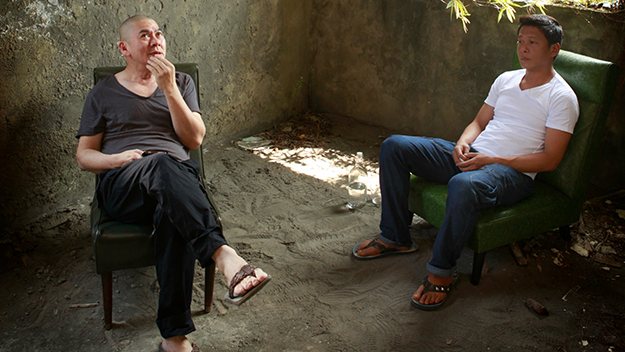
As for the amorous dynamic between them, it’s not easy to fathom. Lee’s screen character is often depicted in relationships with women—sometimes, as in The Wayward Cloud (05), presenting him as a sort of comic stud muffin—while his gay encounters seem to happen as bizarre, perverse accidents, as in the father-son bathhouse encounter in The River (97). There’s a singularly uncomfortable moment here when Tsai talks about an occasion when he lay down next to Lee; the woman in Lee’s life got annoyed because it messed up her neatly made bed. Tsai at one point asks whether Lee has a problem with his sexual orientation. “What has it got to do with me?” comes the reply. Tsai talks about going to gay saunas where he finds a sense of belonging. “You’ve been to some of those places with me,” he says—only for Lee to remind him that he always waited outside, or in a nearby café. Lee habitually deflates Tsai’s more intense comments. “We won’t have a lot of chances to talk like this again,” Tsai says ruefully. Lee retorts: “Says who? We can talk any time.”
Tsai makes two intensely strange comments about his relationship with Lee. One is that Lee is so much a part of him as to be “like a tumor in my body.” The other is a more enigmatic, mystical observation that might offer wider enlightenment on the artist-muse relationship, at least when it comes to artists who prize a certain blankness or absence: “A Bodhisattva that doesn’t appear to be one is a real Bodhisattva. A world that doesn’t appear to be one is a real world. Likewise, you exist because you don’t seem to exist. I think it is that that keeps it together” (try out this observation on your own loved one, see how it goes down).
The pair’s actual relationship is none of our business, except that Tsai has chosen to make it our business by discussing it on screen. You wonder how Lee feels about this, except that his accepted role in life appears to be to go along with whatever Tsai requires. “It’s like I’ve been blessed with a child,” Tsai says. “A good child, or rather, one who is willing to go along with my ideas.” Later, more pointedly: “I think we’re a match made in heaven. You don’t have any desires, and I want to do it my way.” Lee himself would seem to concur: “I am a person of little desires [sic] . . . I believe I am a highly adaptive creature.” Bring to the film your preconceptions about various types of relationship—between lovers, friends, artist and muse—and you may end up feeling that something’s a little wrong here, unbalanced, desperate, even tragic. But then, whose tragedy is it? Tsai seems agonized sometimes, at other times intensely happy. It’s perhaps worrying that his art is so inextricably anchored to Lee, to the point of seeming entirely dependent on him, while it’s unsettling that Lee professes to have so little interest in his career as an actor that he’s never actively sought work beyond Tsai’s oeuvre (notwithstanding some work with directors including Ann Hui, and his own two features, the very Tsai-esque The Missing in 2003 and the more luridly full-on Help Me Eros, in 2007).
The one point at which the pair offer any conventional insight into the two men’s working methods is perhaps the most mundane section, with Lee talking briefly about how he got into key for the deranged cabbage-eating scene in Stray Dogs. A more offbeat insight into the life of a barely separable cinema duo comes in the memories of their travels to festivals. When Tsai asks which places Lee has liked best, the actor noncommittally says Thailand, because it’s “affordable.” Then comes a memory of the two of them in Nantes, where they ended up taking a long taxi ride from the wrong airport in the fog. This image sticks out a mile in a film that’s hardly overflowing with visual stimuli. In the end, I wasn’t sure which was the more powerful picture: two men traveling through fog in an unfamiliar city in a foreign country, or Afternoon’s final image after Tsai and Lee have got up and left, two green chairs in an empty room, as if abandoned by ghosts, with rustling foliage at the windows the only sign of life. But a ruin, as the ending of Stray Dogs shows, can be very full—of feelings, of the past, of indefinable vibrations and apprehensions. And Afternoon—which must surely rank very high in the canon of “films about nothing”—is a very full film indeed, positively brimming over with life, love and the downright strangeness of amorous or artistic desire.
* Also the subject of a stage performance they created together, The Monk from Tang Dynasty.
Jonathan Romney is a contributing editor to FILM COMMENT and writes its Film of the Week column. He is a member of the London Film Critics Circle.



